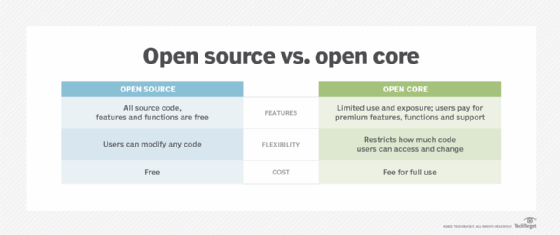open core model (open core software)
What is the open core model (open core software)?
The open core model is an approach to software development that combines attributes of both the Open Source and closed source models.
Under the open core business strategy, a company offers a "core" version of a software product with limited features as free and open source software. Meanwhile, a version of the same product with add-ons is simultaneously released as proprietary commercial software, sometimes referred to as freemium software.
Typically, the free version of the software is based on an existing open source project and is designed to run on a server. This allows a company to build a base of users and contributors who can add to the source code.
The company then develops an enterprise version of the software, with the proprietary value added typically concentrated in areas where the open source project falls short. These added features usually target the needs of corporate customers, such as vertical scalability, third-party integration, improved security and higher speed.
Open core software vendors
Examples of companies that produce open core software include the following:
Established vendors such as Microsoft and IBM have also embraced the open source and open core models.

Benefits and drawbacks of the open core model
The benefits of open core products include lower total cost of ownership, speedier development and greater productivity in IT management or administration. Open source communities often also provide beneficial and high-quality developer tools, APIs and frameworks.
However, the payoff of open core efforts depends on the quality of the implementation of closed source features and the usability improvements of the total product built on an open source core. Some open source efforts also fall short in ease of use, user experience, documentation or productivity due to the disconnect between corporate developers and nontechnical users such as citizen developers and business analysts.
Moreover, the concept of the open core model is itself controversial. Critics say that software cannot be considered "open" if additional fees are required and that the open core model blurs the line between software licenses and fair use.







